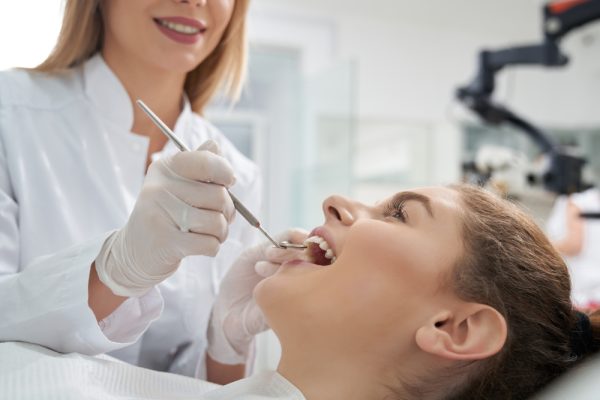Dental Cleanings in Seattle, WA
Keep Your Smile Beautiful and Healthy With Our Seattle Dentist
A beautiful, healthy smile can do wonders for your self-confidence and oral health. By keeping up with routine dental cleanings and exams, our Seattle, WA, dental professionals can help ensure that your oral health is in pristine condition and help avoid prevent cavities, gum disease, and other dental problems.
See why maintaining dental cleaning appointments twice a year will ensure that you achieve pristine dental hygiene and a beautiful smile for years to come with our comprehensive guide.
What Are Dental Cleanings?
Dental cleanings, also known as prophylaxis, are routine procedures done by dentists and dental hygienist teams to remove plaque and tartar buildup from your teeth. Maintaining optimal oral health is an essential part of preventing gum disease and tooth decay. By visiting your dentist twice a year for dental cleanings, you can keep your smile sparkling and prevent oral health problems from arising.
During a dental cleaning, other services, such as dental checkups, are also performed. These aid in detecting any signs of dental problems and when done twice a year, can catch problems early on and allow for successful, less invasive treatments. Your dentist may also provide you with a fluoride treatment, helping protect your teeth from unwanted cavities and other issues.

Dental Cleaning Benefits
Keeping up with professional dental cleanings offers several benefits, including:
- Prevents cavities, tooth decay, gum disease, and other oral health problems
- Early detection of dental problems
- Helps maintain overall health
- Promotes fresher breath
Types of Dental Cleanings
There are several types of dental cleanings. Depending on your dental health, your dentist will recommend the best dental cleaning for you.
Routine Dental Cleanings
Routine dental cleanings are the most common professional cleaning and are recommended for those with good oral health. During a regular dental cleaning, your dentist or dental hygienists will remove plaque and tartar buildup on the surface of your teeth. It’s a quick process that shouldn’t take longer than one hour.
This type of cleaning is typically done twice a year as part of routine dental health care.
Scaling and Root Planing
Scaling and root planing, also known as deep cleanings, are recommended for those with moderate to severe gum disease. During a scaling and root planing treatment, your dentist will remove plaque and tartar buildup from below the gum line. They’ll also smooth out the roots of your teeth to prevent future buildup. Depending on your condition, it can take one or two sessions to complete.
In many cases, one or two sessions of scaling and root planing can reverse the effects of gum disease and prevent it from progressing into further stages.
Periodontal Maintenance
A periodontal maintenance cleaning is done after scaling and root planing to maintain the health of the gums. During periodontal maintenance, your dentist will remove any plaque and tartar that has accumulated since your last deep cleaning. This type of cleaning is typically done every three to four months for patients with gum disease.
Gross Debridement
Gross debridement cleaning isn’t your typical dental cleaning. It’s done to remove plaque and tartar that’s built up too excessively for routine teeth cleaning. This type of dental cleaning is necessary when there’s so much buildup that it makes it difficult for the dentist to perform a thorough oral examination. The gums may be swollen, and the buildup must be removed before a prophylaxis or dental exam can be completed.
Who Needs Dental Cleanings?
Everyone should get a professional dental cleaning at least twice a year, even if they have good oral hygiene habits. Even if you brush and floss your teeth well, some areas are hard to clean properly at home. Those areas will often accumulate plaque and tartar and it should be removed as soon as possible.
Those with underlying dental issues or a history of gum disease may require more frequent teeth cleanings. Your dentist will inform you how often you should go in for routine dental cleanings.

Frequently Asked Questions
No, dental cleanings are typically painless. You may experience some mild discomfort or sensitivity during the cleaning, especially if you have sensitive teeth or gums, but it shouldn’t be painful. Your dentist will provide you with post-operative instructions after the cleaning.
If you’re worried or fearful about pain during your dental cleaning, let your dentist know. They may provide you with a local anesthetic or present other dental sedation options.
A professional dental cleaning typically takes 30 to 60 minutes. However, the length of your procedure depends on the type of cleaning and the extent of buildup on your teeth.
Yes, you can eat after a dental cleaning. However, your dentist will recommend avoiding eating or drinking anything too hot or cold for the first few hours after your dental cleaning.
Many dental insurance plans cover routine dental cleanings, but coverage may vary depending on your plan. You should always check with your insurance provider to understand your coverage and know about any out-of-pocket costs you may be responsible for.
Visit Our Seattle Dentist for Regular Dental Cleanings
Teeth cleanings, regardless of the type, are essential for maintaining good oral health and avoiding dental problems in the future. If you’re wondering where to start to achieve pristine oral health, learn how to find the best general dentist for you and your needs. For those in Seattle, WA, contact our dentists today. With years of experience in general dentistry, you can rest assured that our dentists will help you find the best treatment option for your oral health needs.

